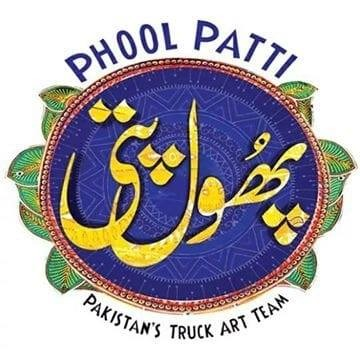Phool Patti Truck Art – A Colorful Journey on the Roads of Pakistan

Phool Patti Truck Art is one of the most vibrant and eye-catching art forms in the world. Originating in Pakistan, this unique style of painting covers trucks and other vehicles with bright colors, floral patterns, calligraphy, and images of famous personalities. But more than just decoration, this art form tells stories, expresses emotions, and showcases the rich culture of Pakistan.
In this article, we’ll explore what Phool Patti truck art is, its history, the role of artists, and how it is now going global—especially through the efforts of Ali Salman Anchan, the founder of Phool Patti, an organization dedicated to promoting this traditional art form.
What is Phool Patti Truck Art?
The term « Phool Patti » means « flower petal » in Urdu. In truck art, it refers to the beautiful floral designs and decorative patterns that are hand-painted onto trucks, buses, and even rickshaws. These designs often include:
- Flowers and birds
- Eye symbols (to protect against evil)
- National heroes or celebrities
- Poetic verses and wise sayings
- Bright, bold colors like red, green, yellow, and blue
Each truck becomes a moving canvas, decorated from bumper to bumper with love and detail. This form of art is not only visual—it reflects the thoughts, dreams, and identities of the truck owners and drivers.
History of Truck Art in Pakistan
Truck art in Pakistan started in the 1940s and 1950s. After independence in 1947, many transport companies began customizing their vehicles. Initially, the designs were simple, but over time, they became more complex and colorful.
The tradition grew in Karachi, Lahore, and Rawalpindi, where skilled painters set up workshops. Today, thousands of trucks in Pakistan are decorated in this style. It is a way for truck drivers to express pride in their vehicles, often spending a large portion of their income on these decorations.
Who is Ali Salman Anchan?
Ali Salman Anchan is a Pakistani visual artist and social entrepreneur who founded Phool Patti, a team of truck artists and designers. He is on a mission to take truck art beyond highways and showcase it globally.
Phool Patti is not just about painting trucks—it’s about reviving a cultural heritage. Under Anchan’s leadership, the team has worked on several creative projects such as:
- Decorating embassy walls and public spaces
- Creating truck art merchandise like bags, T-shirts, and mugs
- Promoting peace messages through art
- Conducting workshops around the world
His work has taken truck art from Pakistan to international platforms like Dubai, Germany, Malaysia, and the United States.
Truck Art as Cultural Identity
Phool Patti truck art is more than just an art form—it is a cultural identity. Every painted truck tells a story. It may reflect the truck driver’s hometown, beliefs, or heroes. The slogans written on the trucks are often funny or philosophical, like:
- « Love is life. »
- « Don’t look at me with envy. »
- « Mother’s prayers are the road to heaven. »
These personal touches make each truck unique and memorable.
The Process Behind the Art
Creating truck art is a time-consuming and skilled job. Here’s how the process works:
- Planning the Design – Artists talk to the truck driver to understand their preferences.
- Sketching – Basic outlines are drawn on the vehicle.
- Painting – Artists use oil paints and brushes to fill in the design with bright colors.
- Adding Accessories – Metal plates, mirrors, tassels, and chains are added for extra flair.
It takes several days or even weeks to fully decorate a truck. The final result is a colorful masterpiece on wheels.
Phool Patti’s Impact on the World
Thanks to the efforts of Ali Salman Anchan and his team, Phool Patti truck art has reached global audiences. Some of their key achievements include:
- Collaborating with international embassies to decorate walls with truck art themes.
- Working with global brands like Coca-Cola, McDonald’s, and Google.
- Hosting exhibitions and art workshops in foreign countries, teaching people how to create traditional truck art.
- Using art to promote peace, tourism, and Pakistani culture.
Phool Patti is not only preserving a beautiful tradition—it’s helping to shape a positive image of Pakistan worldwide.
Truck Art Goes Beyond Trucks
Today, Phool Patti truck art is no longer limited to trucks. It is now used in many creative ways, including:
- Home décor – Furniture, walls, and utensils are being painted with truck art designs.
- Fashion and accessories – Clothing, handbags, and shoes with truck art patterns are becoming popular.
- Corporate branding – Companies are using truck art in their marketing campaigns to stand out.
- Souvenirs and gifts – Tourists love buying colorful mugs, notebooks, and keychains painted in this style.
This trend has opened up new job opportunities for local artists and encouraged the younger generation to learn this traditional art form.
Why Phool Patti Truck Art Matters
Truck art is not just beautiful—it’s meaningful. It tells the world that Pakistan has a rich culture, full of creativity and color. It shows that art doesn’t need to be inside a museum. It can travel across cities, through mountains and deserts, spreading smiles everywhere it goes.
Thanks to Phool Patti and passionate artists like Ali Salman Anchan, this traditional art is being protected, celebrated, and shared with the world.
Conclusion
Phool Patti truck art is one of the most colorful and inspiring parts of Pakistani culture. It transforms ordinary vehicles into mobile masterpieces. Through the vision of artists like Ali Salman Anchan and platforms like Phool Patti, this unique art form is not only being preserved but also promoted globally.
So, next time you see a brightly painted truck on the road, remember—it’s not just a vehicle. It’s a moving work of art, carrying the heart and soul of Pakistan with every mile it drives.
